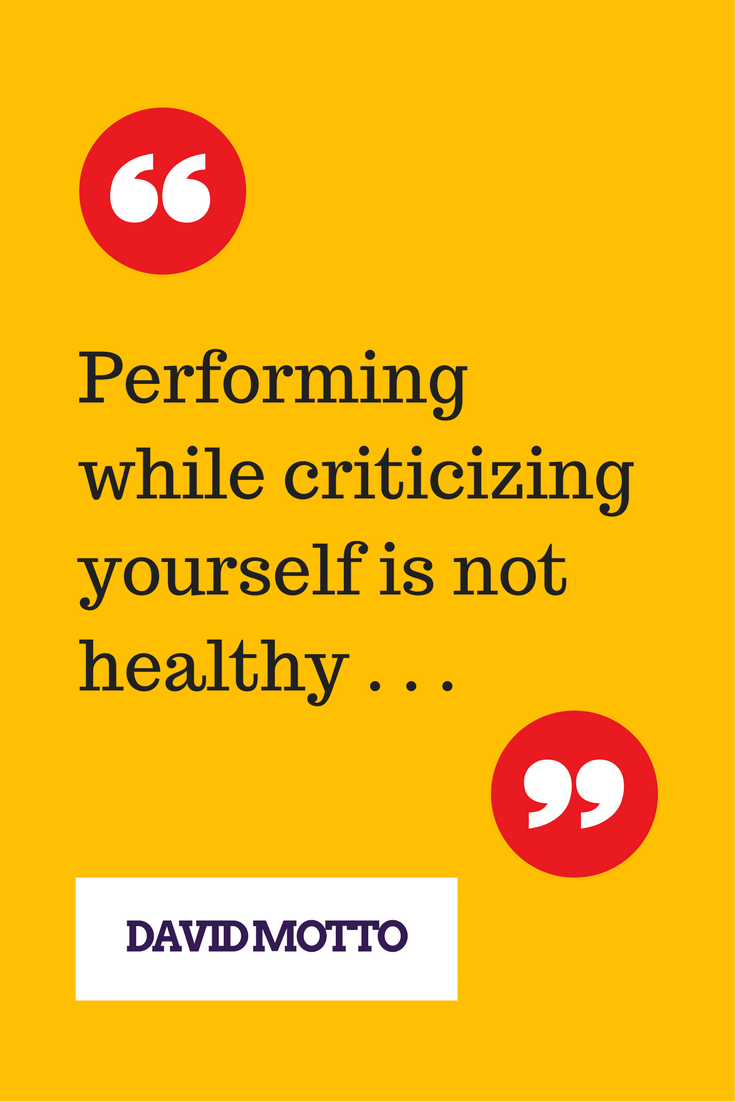David Motto’s Practice Tip of the Week:
Take Control of Your Inner Voice

It’s important to use your inner voice very carefully when you practice and perform.
Did you just think to yourself, “What inner voice?” If you did, that’s the inner voice I’m talking about!!
The inner voice often acts as a critic, stating everything you’re doing wrong. (And, a common name for this voice is our “inner critic.” I’d rather have my inner voice be my inner coach or inner cheerleader!)
At other times, it tells you that you sound great. Really great. The best you’ve ever sounded. The voice is full of pride – and not the good kind of pride where you’re proud of working hard and at your highest level. It’s usually the other, bad kind of pride (also known as hubris), which got pride added to the list of the 7 deadly sins.
Either way – critic or braggart – these thoughts can cause you trouble.
Focusing Outward vs. Focusing Inward
If this voice says things about you, then you have gotten outside the music and have started to think about yourself while you play. Your job as you play is just that—to play. You shouldn’t be thinking about you, your capabilities, and how you’re doing. Performing while criticizing yourself is not healthy!
In a perfect world, we would be able to silence this voice completely while we’re playing. But, turning off the voice is next to impossible for most musicians. Instead, you can control this voice and use it to your benefit.
The key is to focus this voice on the process of playing the music itself.
For instance, you can say, “Play those notes loudly” as opposed to saying “I always forget to play those notes loudly, so I better remember this time.” Though these two statements assert the same idea, only the first version helps you play better by focusing outward toward the music.
The second version points inward toward yourself. It also describes a perceived weakness that you may or may not actually have. This inward focus should be avoided at all costs.
Be Wary of Self-Praise
The funny thing about the inner voice is that it causes difficulties in your playing even when it gives positive feedback. Whether the voice is criticizing or praising you, it can be a hazard to your musical health.
If you tell yourself, “I sound great” while you’re playing, it’s a sure sign that you’re outside the music. You’re thinking about yourself instead of just playing.
As soon as the inner voice begins to praise, you will most likely make a mistake in your playing. The higher the praise, the more likely the mistake.
For instance, if you say “This is the best I’ve ever sounded,” you are sure to fumble on some passage that is usually the easiest in the song.
Looking Forward vs. Looking Backward
One reason for this strange phenomenon is that thinking about yourself looks backward—at what you just did. Meanwhile, the music is still moving forward and needs your undivided attention. While you’re busy praising yourself and how well you’ve been doing, no one is in charge of the upcoming notes!
You’ve got enough to do to keep your music rolling forward without adding the extra burden of thinking about what you just did – in the past! So, whether what you just did was amazing or terrible or somewhere in between, keep your inner voice focused on the task at hand.
The practice room is the best place to start focusing your inner voice toward the technical details of your music. Don’t criticize yourself. Just give directions on how to execute the notes.
To Your Musical Success!
David Motto

Annie – Thank you for your great observation about playing difficult parts (which I simply call “Tough Stuff”) and the negative effect of thinking about how you’re doing while you’re playing those parts. We all strive for making the Tough Stuff automatic – so that it’s in our muscle memory and we can focus on thing like phrasing and emotion instead of simply hitting all the notes. In sports, we would use the word “choke” to talk about a high-level player suddenly having too much self-awareness and thinking too much about what usually comes automatically for them. As soon as we pay too much attention to our technique while performing, we can easily choke and ruin our performance. At a certain point, the goal is to be in flow rather than worrying about individual details.
This is a really good tip, thanks. That must be why if you play a hard part and think about how you are doing it right, you stop doing it right. Your articles have a lot of great stuff in them.